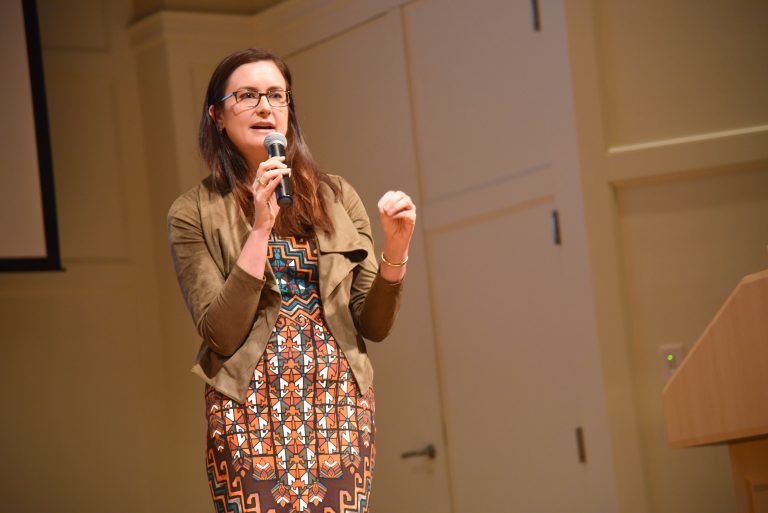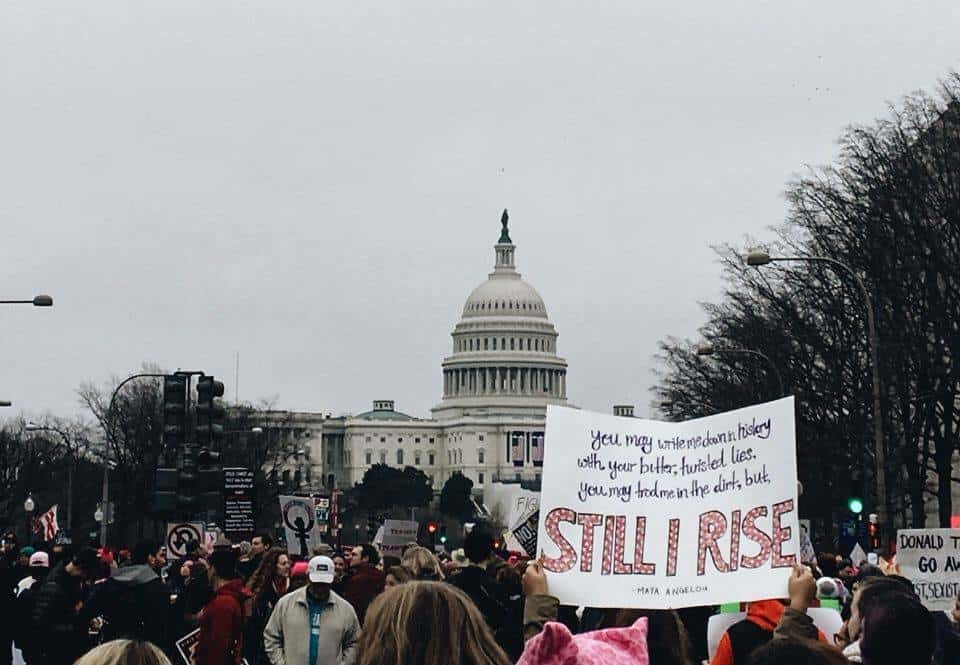Take Action to Draw Down Greenhouse Gas Emissions

Dr. Katharine Wilkinson spoke at Wake Forest University on October 5, 2017 on the 80 solutions to reversing global warming.
We are already experiencing the effects of climate change— temperatures are rising, precipitation patterns are shifting, and more extreme climate events are occurring around the globe. These changes are linked to the rising levels of carbon dioxide and other greenhouse gases in our atmosphere. The good news? There’s still hope. That’s our takeaway from studying Drawdown and engaging with the book’s senior writer, Dr. Katharine Wilkinson, during her visit to Wake Forest on October 5.
Drawdown transforms the doom-and-gloom narrative of climate change into a story of courage and possibility. It shows that 80 solutions to reducing greenhouse gas emissions are already in place, economically viable, and being implemented in communities around the world with steadfast determination, and that 20 more innovative solutions are coming out of the gates.
Nevertheless, the idea of reversing global warming is hard to comprehend on an individual level. It’s no wonder that throughout Wilkinson’s visit, the question of “How can I get involved with Project Drawdown?” surfaced again and again at different engagements.
The answer, as explained by Wilkinson, is that all solutions presented in Drawdown depend on how individuals and institutions choose to invest their time, energy, finances, and thought into reducing greenhouse gas emissions. Drawdown proves that while decisions made by industry, government, and other groups have a major impact on our future on this planet, individual decisions are equally as important.
To help you determine what you can do to make a difference, we have compiled a list of five of the 26 Drawdown solutions being implemented at Wake Forest that you can adopt today.
Advocate for women’s rights. If you add solutions #6 and #7, Educating Girls and Family Planning, empowering women and girls is the number one solution to reversing global warming. Due to existing inequalities, women and girls are disproportionately vulnerable to the impacts of climate change. At the same time, women and girls are vital to successfully addressing climate change and humanity’s overall resilience. Join the WFU Women’s Center for events such as Passing the Mic or become a peer educator for women’s equity with the L.E.A.V.E.s Program. By improving the rights, well-being, and equity of women and girls, we can improve the future of life on this planet.
Say no to food waste. Eight of the top 20 Drawdown solutions pertain to food. The #3 ranked solution is Reduced Food Waste and the #4 solution is a Plant-Rich Diet — both of which people can adopt immediately and at no cost. That being said, how many times have you tossed out milk that hasn’t gone bad, or forgotten about leftovers in your refrigerator? Remember to take only what you want to eat when eating at a dining hall, be sure to prioritize leftovers, grocery shop only when needed, and use your senses to determine when food has gone bad instead of relying solely on ambiguous sell-by labels.
Eat food. Not too much. Mostly plants. To quote Michael Pollan, “Eat food. Not too much. Mostly plants.” Shifting to a plant-rich diet is a demand-side solution to global warming. By dining multiple times per day, imagine how many opportunities you have to turn the tables. With Wake Forest’s commitment to plant-forward dining, it’s easy to turn Pollan’s mantra into a daily routine.
Get there the green way. Transportation produces the equivalent of 7 gigatons of carbon dioxide in greenhouse gas emissions annually. At Wake Forest, students, faculty, and staff have access to SharetheRideNC, Zipcar, the Re-Cycle Bike Share Program, Wake Forest shuttles, and local public transportation and ride-sharing opportunities from PART.
Take action. Get involved locally and nationally with those who are already implementing solutions. For example, join the local Sierra Club chapter, become a member of the Piedmont Environmental Alliance, support female education and empowerment, and elect local, state, and national representatives who support clean water, air, strong climate action, and community well-being. Remember, only you are in charge of how you spend your time, energy, finances, and thought— put your power to good use.

